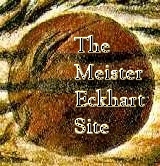|
|
||
 |
Meister Eckhart Home / Works by Meister Eckhart - Quotes / Inspired by Eckhart / Studies / The Papal Condemnation / Mail & Announcements / Links / Books |
The First German Movement In Its European Setting (1270-1350)
Page 11
Johannes Tauler was Eckhart's disciple, and defended his master even though he was persecuted for it. For the guidance of convents of nuns and groups of friends of God, Tauler transformed Eckhart's lofty intellectualist and mystical philosophy into a doctrine of God, the world and life which became the basis of European quietism and sentimentalism. Wherever there was a sense that the ecclesiastical order had grown still and unhallowed, and people were trying to reanimate it from within, to permeate it or to overthrow it, Tauler's spirit took root. Both Rousseau and Kant owed a great deal to this man. In Germany, he became the secret Emperor of all the "silent in the land" who were engaged in building up their own "secret empire" [32] within their own souls. If, at first, his outlook seems less radical and less cataclysmic than Eckhart's it must be remembered that he was a member of a persecuted underground [33]. The enormous pressure upon him and his hearers can be felt in almost every sermon: be content to be despised and condemned, to be persecuted or killed; cast yourselves upon God! This political situation was the seed-bed of quietism, of a quiet, yet firm spirit of resistance. It produced a Nicodemism which surrounded all delicate questions with careful circumlocutions, but it also created a new formulation of the rights of man which first came into being on the fringe of orthodoxy and amongst small groups of non-conformists [84]. Tauler did not reject civil or ecclesiastical authority; he preached a pietistic abandonment to their rule - "though pope, bishops and prelates should be as wolves around me, I would yet endure them" [35]. He showed, however, that they had become thoroughly unholy and impotent to save, doomed to destruction by their lust for power, wealth and honours [36]. (Note of the author: There was also a certain amount of petty-bourgeois resentment against the great lords. The Imitation of Christ and the whole devotio moderna movement which shared a common foundation with Tauler became one of the most momentous forces during the succeeding centuries, partly because of this class resentment.)
Cf. Meister Eckhart von Friedrich Heer ||| Mail: Heer, Tauler & nazism